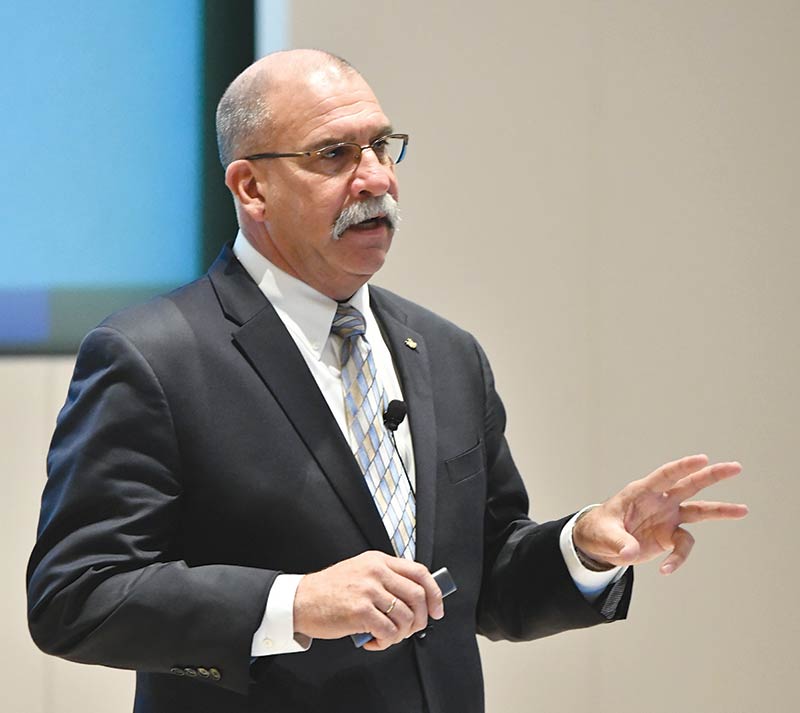Training ALPA’s Real-Time Pilot Leaders
By Capt. Bill Couette, ALPA Vice President–Administration/Secretary

During the start of every year, ALPA hosts the Leadership Training Conference for its newest class of local council representatives and officers to help them prepare for their duties before they officially take office in March. As your union’s vice president–administration/secretary, I’ve had the pleasure of hosting this event with ALPA’s Leadership Committee for the past 14 years. I’ve seen hundreds of ALPA members “graduate” from this training with a better understanding of what’s expected of them during their term and the resources available to them. I’m proud to say that no other union prepares their future leaders like ALPA.
Thirty years ago, when I became a new local council officer, I wondered what my responsibilities would be. I soon learned that serving as a frontline ALPA leader is one of the most satisfying and rewarding posts this organization has to offer. From addressing the concerns of local council members to coordinating contract negotiations to serving as a member of the Association’s Board of Directors, these elected officials are involved in nearly every aspect of the union’s activities.
In my current role, I oversee ALPA’s Professional Development Group, including the Leadership Committee, which sponsors the Leadership Training Conference and works throughout the year with individual pilot groups that request additional assistance. During this year’s conference, I gave several presentations to help participants better understand their responsibilities, ways to work more efficiently, and the extensive resources available to help them succeed in their union work.
To better acquaint the group with its day-to-day activities, I explained that ALPA’s frontline leaders spend the majority of their time doing four basic things: communicating with their members about the union’s plans and activities; representing pilots, whether it’s before ALPA’s governing bodies in making union decisions or airline managements in addressing potential disciplinary actions and grievance cases; recruiting volunteers for committee work and other union functions; and serving as a real-time reference for their pilots.
While each of these functions is important to the Association’s structure and integrity, I want to stress the value of this last task. It’s essential that frontline ALPA leaders know the fundamentals. They need to have a basic understanding of their contract, its terms and conditions, and how it works. They need to know Robert’s Rules of Order so they can conduct meetings while maintaining control and authority. They need this foundation because as elected leaders, they serve as the face of the union.
Fortunately, ALPA pilot leaders also have an incredible amount of resources at their disposal. They have seasoned attorneys from the Association’s Representation and Legal Departments who can advise them regarding the law, regulations, and labor practices. Analysts from ALPA’s Economic & Financial Analysis Department can brief them on the state of the airline industry and the economic health and well-being of their airlines. And professional staff from the Communications, Information Technology, Retirement & Insurance, and Strategic Member Development and Resources Departments can provide additional services and support.
The newly elected leaders also have the Association’s national committee structure and their fellow local council reps and officers from the union’s 35 pilot groups to network with and compare notes. And in addition to the Leadership Training Conference, ALPA offers a host of training programs to help all of the union’s pilot volunteers succeed in carrying out their duties.
In many respects, this conference is a prime example of what makes ALPA successful: pilots serving pilots. It prepares elected pilots to serve in the best interests of and act on behalf of their fellow pilots and to be accountable and transparent when fulfilling their responsibilities.
Local council reps and officers acting as real-time references serve as the basis for our union’s organizational structure: someone to serve as a point of contact when pilots need help, someone who understands work rules and job protections, and someone who can find answers when pilots have questions. It’s been said that helping others is the best way we can help ourselves, and providing this kind of assistance at ALPA starts with trained frontline leaders understanding how the union works to best support its pilots.

